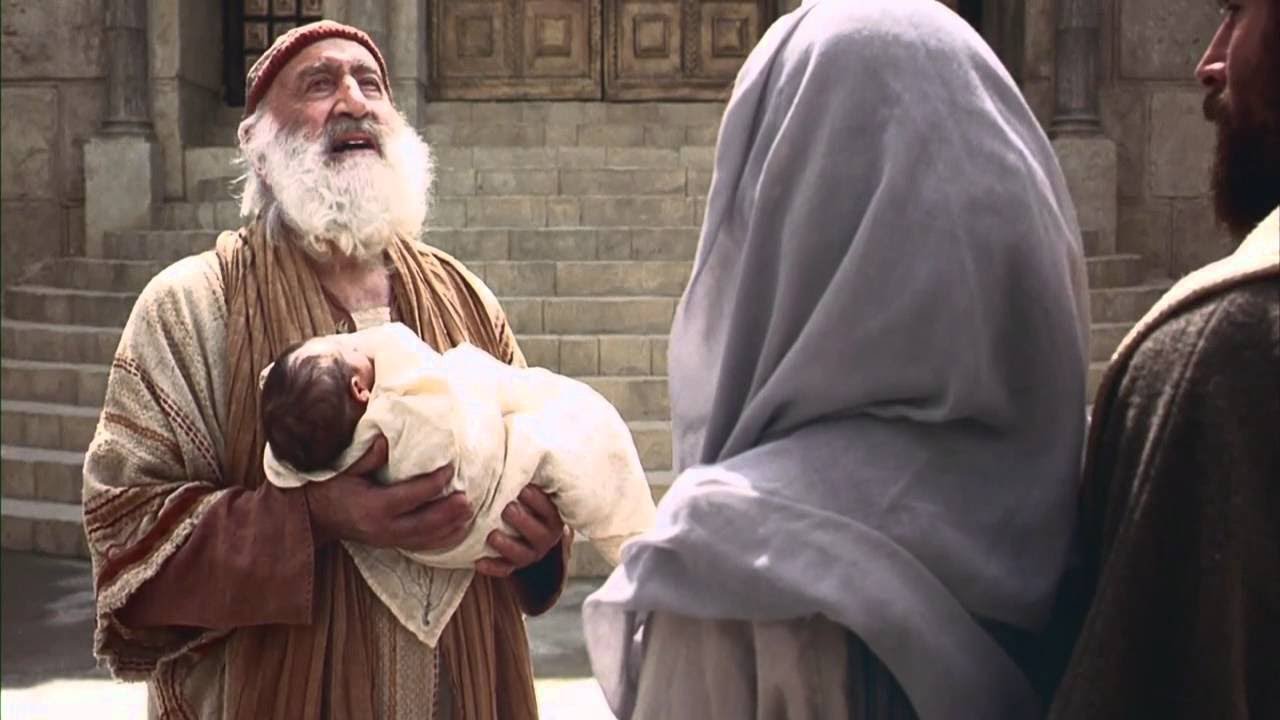A character in the story of the birth and early days of Jesus we often overlook is a man named Simeon.
Simeon was a devout Jew who regularly worshiped in the Temple at Jerusalem and was there when Mary and Joseph brought Jesus in. Luke tells the story in Chapter 2, verses 22 thru 35:
And when the time came for their purification according to the Law of Moses, they brought him up to Jerusalem to present him to the Lord (as it is written in the Law of the Lord, “Every male who first opens the womb shall be called holy to the Lord”) and to offer a sacrifice according to what is said in the Law of the Lord, “a pair of turtledoves, or two young pigeons.” Now there was a man in Jerusalem, whose name was Simeon, and this man was righteous and devout, waiting for the consolation of Israel, and the Holy Spirit was upon him. And it had been revealed to him by the Holy Spirit that he would not see death before he had seen the Lord’s Christ. And he came in the Spirit into the temple, and when the parents brought in the child Jesus, to do for him according to the custom of the Law, he took him up in his arms and blessed God and said, “Lord, now you are letting your servant depart in peace, according to your word; for my eyes have seen your salvation that you have prepared in the presence of all peoples, a light for revelation to the Gentiles, and for glory to your people Israel.” And his father and his mother marveled at what was said about him. And Simeon blessed them and said to Mary his mother, “Behold, this child is appointed for the fall and rising of many in Israel, and for a sign that is opposed (and a sword will pierce through your own soul also), so that thoughts from many hearts may be revealed.”
Unlike the first announcement of Jesus’ birth, which came from an angel, on this occasion, God speaks through two of his servants: Simeon and, later, a devout woman, Anna. Luke says they were awaiting the coming of “the Lord’s Christ” and “the consolation of Israel.”
When Simeon sees Jesus, he quotes some passages from Isaiah. He, in essence, declares that salvation has come through God’s promised Messiah—not just for the Jews but also for the Gentiles.
Saying that Simeon was filled with joy at this revelation would be an understatement. He was so happy that he was ready to die. All of his hopes and dreams were fulfilled with the birth of Jesus, the advent of the Messiah.
Imagine the scene. It was a busy time at the temple, and Jesus’ birth had created quite a stir. Simeon was there, along with Anna, who was also advanced in age. Both had been waiting for the consolation of Israel, and the Holy Spirit was upon them.
They had waited a long, long time. But they faithfully and patiently persevered because God had told Simeon that he would not die before seeing the Messiah. We don’t know when exactly Simeon received this revelation, but like Abraham, he believed and trusted God.
Then, perhaps to the surprise of many there, Simeon exclaims, “my eyes have seen your salvation that you have prepared in the presence of all peoples, a light for revelation to the Gentiles, and for glory to your people Israel.” Wow! I can’t help but wonder if some around him thought, “what in the world is he talking about?”.
The fulfillment of Simeon’s prophetic revelation may have come differently than he thought it would—a young couple presenting their firstborn at the temple. But he recognized it when it happened. Do you ever wonder what you would have thought had you been in Bethlehem when Jesus was born or at the temple that day in Jerusalem?
Another baby brought by its devout parents to the temple as part of the Jewish purification rite forty days after his birth—what’s the big deal?
God had made a promise to Simeon. No matter how or when Simeon thought it might be kept, he had to trust God to do it through whatever means he chose; in this case, the birth of a baby boy to an ordinary couple in less than optimal circumstances in a small town many miles from Jerusalem.
Simeon and Anna believed God and so waited and watched for the Messiah. This required faith, which engendered hope. But their hope was not in an ordinary man, an emperor, or a king; it was in the God who had spoken and promised that redemption would come.
Later in this story, Simeon speaks directly to Mary and tells her that some will believe in the Messiah and his offer of salvation, but also that many will resist and rage against it. We see that fulfilled in Jesus’ day and also in ours.
We are now on the other side of this story, and we can look back to Jesus’ birth, life, death, resurrection, and ascension. As believers in and, therefore, recipients of all God accomplished in and through Christ, our hearts are filled with hope and joy. Our hope is in what God has done, but we can also hope for what Jesus promised John he will do in the future:
Consider these verses from Revelation 22:
I, Jesus, have sent my angel to testify to you about these things for the churches. I am the root and the descendant of David, the bright morning star. I am the Alpha and the Omega, the first and the last, the beginning and the end. These words are trustworthy and true. And the Lord, the God of the spirits of the prophets, has sent his angel to show his servants what must soon take place. And behold, I am coming soon. Blessed is the one who keeps the words of the prophecy of this book. Blessed are those who wash their robes so that they may have the right to the tree of life and that they may enter the city by the gates. The Spirit and the Bride say, “Come.” And let the one who hears say, “Come.” And let the one who is thirsty come; let the one who desires take the water of life without price. He who testifies to these things says, “Surely I am coming soon.” Amen. Come, Lord Jesus!” (Revelation 22, ESV)
Simeon and Anna were good stewards of the promise they had been given. They watched and waited with great hope and expectancy for its fulfillment. We, too, have a great promise—the promise of salvation and of the Second Coming of Christ, leading to the restoration of all things.
Just as Simeon spent his life anticipating Christ’s arrival, similarly, we should live anticipating Christ’s return—the Second Advent (see Acts 1:11 and Titus 2:13). We have no more extraordinary promises and no greater hope.
As I get ever closer to the day I will see the Messiah—my Savior—face to face, I want my hope and expectation to grow stronger, like Simeon’s. I want to trust in God to fulfill his promises as I wait on those promises and the revealed plans and purposes that God has for me and all who have put their faith and trust in him (see 1 Thess. 5:23-24).
We can all look forward with hope in the expectation that John’s revelation will one day become our reality:
Then I saw a new heaven and a new earth, for the first heaven and the first earth had passed away, and the sea was no more. And I saw the holy city, new Jerusalem, coming down out of heaven from God, prepared as a bride adorned for her husband. And I heard a loud voice from the throne saying, “Behold, the dwelling place of God is with man. He will dwell with them, and they will be his people, and God himself will be with them as their God. He will wipe away every tear from their eyes, and death shall be no more, neither shall there be mourning, nor crying, nor pain anymore, for the former things have passed away.” And he who was seated on the throne said, “Behold, I am making all things new.”

